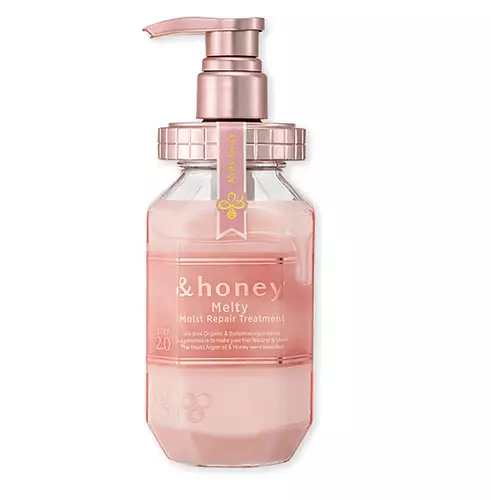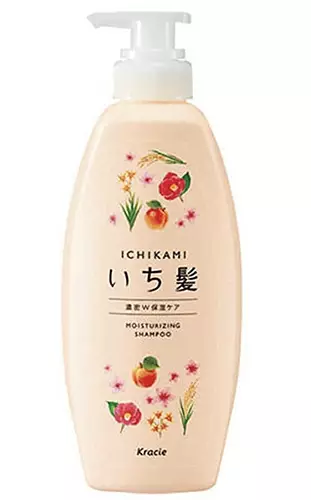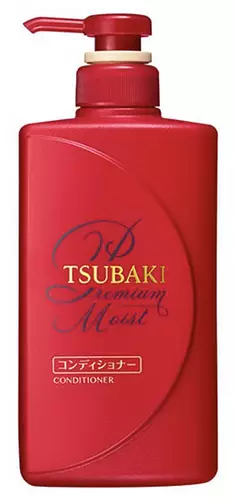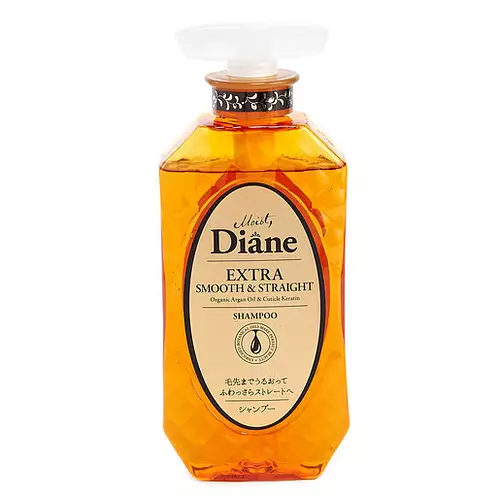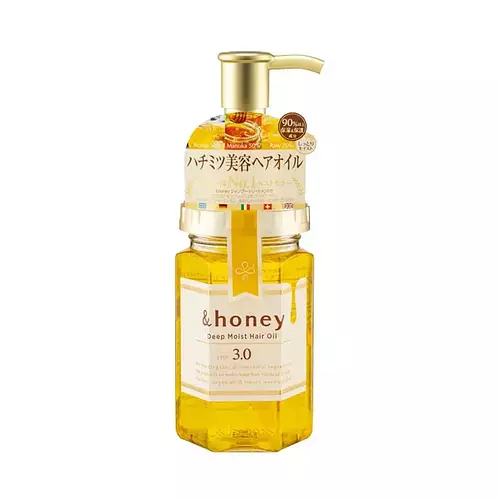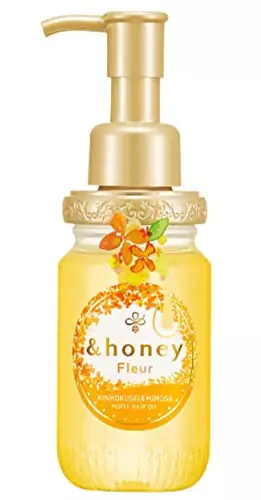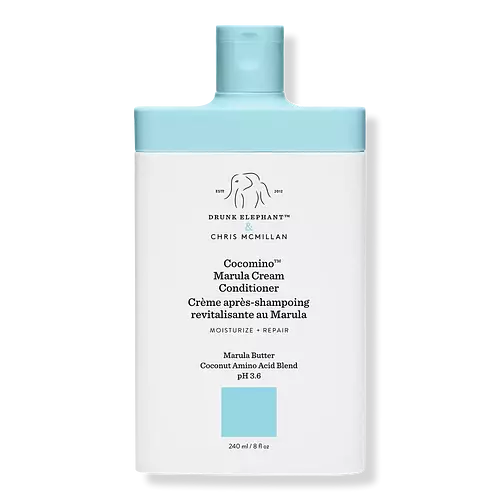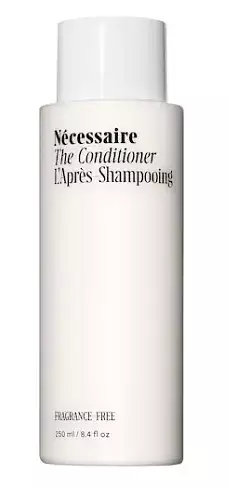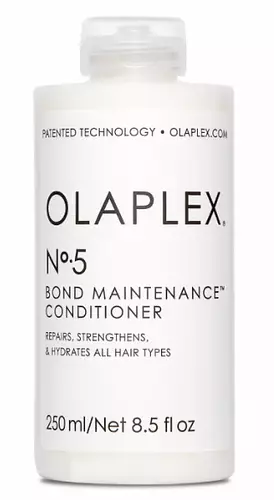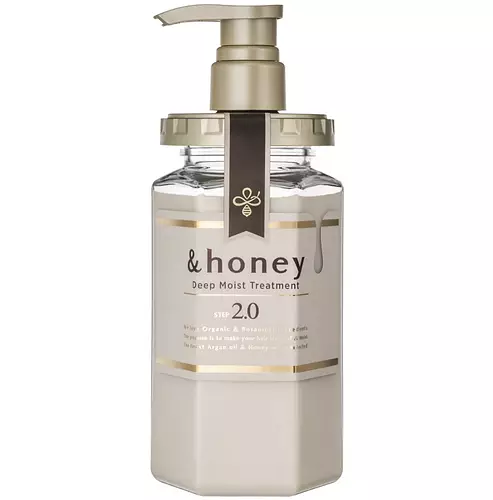
Vicrea &honey Deep Moist Treatment 2.0 Ingredients Explained
Published on January 10, 2023 Submitted by unicorn
Overview
What it is
Conditioner with 33 ingredients that contains PHA
Cool Features
It is reef safe
Suited For
It has ingredients that are good for fighting acne, anti aging, dry skin, brightening skin, sensitive skin, scar healing and better texture
Free From
It doesn't contain any harsh alcohols, parabens or sulfates
Fun facts
Vicrea is from Japan. This product is used in 8 routines created by our community.
We independently verify ingredients and our claims are backed by peer-reviewed research. Does this product need an update? Let us know.
Ingredient List (33)
Water, Cetearyl Alcohol, Amodimethicone, Behentrimonium Chloride, Glycerin, Ethylhexyl Palmitate, Honey, Honey Extract, Hydrolyzed Honey Protein, Gluconolactone, Argania Spinosa Kernel Oil, Keratin, Royal Jelly Extract, Propolis Extract, Hydroxypropyltrimonium Hyaluronate, Sodium Carboxymethyl Hyaluronate, C9-11 Alkyl Glucoside, Lavandula Angustifolia Flower Extract, Panthenol, Hydrolyzed Silk , Arabinose, Citric Acid, Caramel, Hydroxyethylcellulose, Tea-Sorbate, Pentetic Acid, Dimethicone, Sodium Benzoate, Aminopropyl Dimethicone, Trimethylsiloxyphenyl Dimethicone, Phenoxyethanol, Butylene Glycol, Parfum
You should know
Notable Ingredients
This product contains 1 ingredient that may have this attribute:
Benefits
This product contains 2 ingredients that may have this attribute:
This product contains 1 ingredient that may have this attribute:
This product contains 1 ingredient that may have this attribute:
This product contains 1 ingredient that may have this attribute:
This product contains 1 ingredient that may have this attribute:
This product contains 1 ingredient that may have this attribute:
This product contains 1 ingredient that may have this attribute:
Concerns
This product contains 2 ingredients that may have this attribute:
This product contains 2 ingredients that may have this attribute:
This product contains 1 ingredient that may have this attribute:
This product contains 1 ingredient that may have this attribute:
Ingredient Info
Alcohol Free
This product is free of harsh alcohols 🎉
Contains Silicon
Ingredients in this product that are types of silicon:
Contains Fragrance
Ingredients in this product that are forms of fragrance:
Sulfate Free
This product is free of sulfates 🎉
Paraben Free
This product is free of parabens 🎉
Contains Oils
Ingredients in this product that are types of oil:
Not Malassezia Safe
Ingredients in this product that are not malassezia safe:
Reef Safe
This product is free of ingredients that damage reefs 🎉
Contains EU Allergens
Ingredients in this product that are EU allergens:
Non Vegan
This product is not vegan 😥
Not Cruelty Free
This product is not cruelty-free 😥
Ingredients Overview
Ingredients Explained
Water. It's the most common cosmetic ingredient of all. You'll usually see it at the top of ingredient lists, meaning that it makes up the largest part of the product.
So why is it so popular? Water most often acts as a solvent - this means that it helps dissolve other ingredients into the formulation.
You'll also recognize water as that liquid we all need to stay alive. Talk about multi-purpose! If you see this, drink a glass of water. Stay hydrated!
Learn more about WaterCetearyl alcohol is a mixture of two fatty alcohols: cetyl alcohol and stearyl alcohol. It is mainly used as an emulsifier. Emulsifiers help prevent the separation of oils and products. Due to its composition, it can also be used to thicken a product or help create foam.
Cetearyl alcohol is an emollient. Emollients help soothe and hydrate the skin by trapping moisture.
Studies show Cetearyl alcohol is non-toxic and non-irritating. The FDA allows products labeled "alcohol-free" to have fatty alcohols.
This ingredient is usually derived from plant oils such as palm, vegetable, or coconut oils. There is debate on whether this ingredient will cause acne.
Due to the fatty acid base, this ingredient may not be Malassezia folliculitis safe.
Learn more about Cetearyl AlcoholThis ingredient is a preservative and often used for it's anti-static properties. You'll most likely see this ingredient in hair conditioners.
It does not cause irritation or sensitization in leave-on products at 1-5%.
Glycerin is already naturally found in your skin. It helps moisturize and protect your skin.
A study from 2016 found glycerin to be more effective as a humectant than AHAs and hyaluronic acid.
As a humectant, it helps the skin stay hydrated by pulling moisture to your skin. The low molecular weight of glycerin allows it to pull moisture into the deeper layers of your skin.
Hydrated skin improves your skin barrier; Your skin barrier helps protect against irritants and bacteria.
Glycerin has also been found to have antimicrobial and antiviral properties. Due to these properties, glycerin is often used in wound and burn treatments.
In cosmetics, glycerin is usually derived from plants such as soybean or palm. However, it can also be sourced from animals, such as tallow or animal fat.
This ingredient is organic, colorless, odorless, and non-toxic.
Glycerin is the name for this ingredient in American English. British English uses Glycerol/Glycerine.
Learn more about GlycerinEthylhexyl Palmitate is created from 2-ethylhexyl alcohol and palmitic acid. It is a fatty acid ester.
The fatty acid content of Ethylhexyl Palmitate makes it an emollient. Emollients help soften and hydrate your skin by trapping moisture within.
Ethylhexyl Palmitate is also used to help improve the texture of cosmetics. It helps other ingredient dissolve in products and help disperse ingredients more evenly. In fact, it is commonly used to evenly mix sunscreen ingredients such as avobenzone and ethylhexyl triazone. It can also help stabilize the fragrances in a product as a fragrance fixative.
Ethylhexyl Palmitate can be used to substitute mineral oil.
Learn more about Ethylhexyl PalmitateHoney comes from bees. It is mainly made up of fructose and glucose. Honey also contains amino acids, peptides, Vitamins A, C, and E. Vitamins A, C, and E all offer numerous skin benefits.
Honey is hydrating, antibacterial, anti-aging, and skin soothing.
The humectant property of honey makes it great at helping to hydrate the skin. Humectants draw moisture from the air to your skin.
Honey may help reduce the signs of aging due to its antioxidant properties. Antioxidants help protect your skin against free-radical molecules. If left unchecked, these molecules may damage your skin cells and DNA. Fun fact: darker honey is a antioxidant than light honey.
The antibacterial property of honey may make it effective at helping to treat acne. We recommend speaking with a professional if you have concerns.
Many people wonder if honey is vegan. It is technically a byproduct from bees. This is because honey is created from the digestive enzymes in a bee's stomach.
Remember to be kind to bees :) They are important for many ecosystems and are endangered.
Learn more about HoneyWe don't have a description for Honey Extract.
We don't have a description for Hydrolyzed Honey Protein.
Gluconolactone is a PHA. PHAs have a larger structure than AHAs and BHAs and are more gentle. It is an created by reacting gluconic acid with an alcohol.
When applied, Gluconolactone has the same affect on skin as AHAs such as lactic acid. It helps dissolve the dead skin cells in the top layer of your skin. This helps improve texture and brightens the skin.
Gluconolactone is a humectant and helps draw moisture to your skin. This helps keep your skin hydrated.
PHAs are more gentle than AHAs due to their larger structure. They do not penetrate as deeply as AHAs and take a longer time to dissolve dead cells. Studies show PHAs do not cause as much irritation.
PHAs also exhibit antioxidant activity by neutralizing free-radical molecules. This can help with anti-aging.
In a 2004 study, Gluconolactone was found to prevent UV damage in mouse skin cells. However, we still recommend wearing SPF especially after using exfoliating ingredients.
Learn more about GluconolactoneArgania Spinosa Kernel Oil is derived from the kernels of the argania spinosa tree. You may know it as argan oil.
Argan Oil is an antioxidant, hydrating, and soothing ingredient.
Studies have shown argan oil can help fight again radical damage from the sun. This makes it effective at preventing hyperpigmentation.
Large amounts of vitamin E found in argan oil helps the skin retain water. Argan oil also contains fatty acids such as linoleic acid, oleic acid, and palmitic acid. It is also a good source of lipids.
Another benefit of argan oil is skin-soothing. It can help reduce inflammation-related skin symptoms.
Argan Oil is effective at regulating sebum production in pores. This can make it effective at treating hormonal acne.
Traditionally, argan oil was used for its antibacterial and antifungal properties. However, argan oil contains fatty acids that may make it not fungal-acne safe.
Argan Trees are native to Morocco.
Learn more about Argania Spinosa Kernel OilKeratin is a protein naturally found in our hair and skin.
In haircare, it has been shown to seal broken cuticles. This can help prevent breakage and split ends.
Royal Jelly Extract comes from a secretion made by worker honeybees. This secretion is white and described as creamy.
Royal Jelly contains antibacterial, anti-aging, and anti-inflammatory properties.
Studies show Royal Jelly to contain amino acids, fatty acids, and a variety of vitamins, including Vitamin Bs. Many of these components are antioxidants, which help with anti-aging. The fatty acids in Royal Jelly make it a hydrating ingredient.
Several animal studies show Royal Jelly to boost collagen production and reduce inflammation.
The Vitamin Bs found in Royal Jelly include:
Learn more about Royal Jelly ExtractPropolis Extract is also known as bee glue. It is a resinous mixture created from beeswax, bee saliva, and parts of trees.
Propolis Extract has antimicrobial, anti-inflammatory, wound healing, and antioxidant properties. Studies show propolis helps fight against bacteria, viruses, and fungi. This may help with reducing acne and accelerate wound healing.
The flavonoids found in propolis extract are potent antioxidants. Antioxidants may help with reducing the signs of aging.
A study from 2020 found propolis to help reverse skin damage from UV.
Bees use propolis as a sealant to close any gaps in their hives.
speeding up new healthy cell growth.
Learn more about Propolis ExtractThis form of hyaluronic acid is produced through fermentation.
According to a manufacturer, it has a positive charge by ionic binding to help moisturize and give hair a smooth feel. This is why you'll find this ingredient in shampoos and body washes.
We don't have a description for Sodium Carboxymethyl Hyaluronate.
We don't have a description for C9-11 Alkyl Glucoside.
Lavandula Angustifolia Flower Extract comes from the lavender plant. Lavender extract has anti-inflammatory and antioxidant properties.
Many components of lavender flowers are antioxidants, such as ferulic acid, caffeic acid, and several flavonoids.
Traditional Iranian folk medicine uses Lavender extract to help treat inflammation.
Lavender extract may have a scent. It contains linalool, a known allergen. However, lavender extract contains less linalool than lavender essential oil.
Learn more about Lavandula Angustifolia Flower ExtractPanthenol (also referred to as pro-vitamin B5) is a common ingredient that helps hydrate and soothe the skin.
lt is a humectant, meaning that it helps the skin attract and retain moisture.
Another benefit is the anti-inflammatory abilities. This means that it's great for sensitive, irritation-prone skin.
Once oxidized, panthenol converts to pantothenic acid. Panthothenic acid is found in all living cells.
Learn more about PanthenolYou can find hydrolyzed silk in both haircare and skincare products. According to a manufacturer, it can help improve skin and hair hydration.
This ingredient is created by adding acid or enzymes to 'hydrolyze' silk protein.
Due to the origins of this ingredient, it is not vegan. Silk is an animal product from silkworms.
Depending on the source, this ingredient can be considered cruelty-free. It is created from left-over cocoons of silkworms. We recommend reaching out to the brand if you have questions about where their hydrolyzed silk comes from.
Learn more about Hydrolyzed SilkCitric Acid is an AHA derived from citrus fruits (think oranges, lemons, and limes!).
If you spot Citric Acid near the end of an ingredient list, it's likely there as a pH adjuster rather than an active ingredient.
As an AHA, Citric Acid removes the top layer of skin cells from the newer layer of skin underneath. This helps skin to remove dark spots and look more even.
Read more about some other popular AHA's here:
Learn more about Citric AcidWe don't have a description for Caramel.
Hydroxyethylcellulose is used to improve the texture of products. It is created from a chemical reaction involving ethylene oxide and alkali-cellulose. Cellulose is a sugar found in plant cell walls and help give plants structure.
Hydroxyethylcellulose helps stabilize products by preventing ingredients from separating. It can also help thicken the texture of a product.
This ingredient can also be found in pill medicines to help our bodies digest other ingredients.
Learn more about HydroxyethylcelluloseDimethicone is a silicone used for making products smooth and silky. It also has the added benefit of sealing in hydration. The amount of dimethicone found in beauty products is considered safe and non-comedogenic, meaning it won't clog pores.
Dimethicone has been found increase absorption in skin, boosting the benefits of other ingredients. While there is concern for the safety of dimethicone, the levels used in skincare are safe for use.
Sodium Benzoate is a preservative. It's used in both cosmetic and food products to inhibit the growth of mold and bacteria. It is typically produced synthetically.
Both the US FDA and EU Health Committee have approved the use of sodium benzoate. In the US, levels of 0.1% (of the total product) are allowed.
Sodium benzoate works as a preservative by inhibiting the growth of bacteria inside of cells. It prevents the cell from fermenting a type of sugar using an enzyme called phosphofructokinase.
Sodium Benzoate is the salt of benzoic acid. Foods containing sodium benzoate include soda, salad dressings, condiments, fruit juices, wines, and snack foods.
Studies for using ascorbic acid and sodium benzoate in cosmetics are lacking, especially in skincare routines with multiple steps.
We always recommend speaking with a professional, such as a dermatologist, if you have any concerns.
Learn more about Sodium BenzoateTrimethylsiloxyphenyl Dimethicone is a type of silicone.
Phenoxyethanol is a preservative that has germicide, antimicrobial, and aromatic properties. Studies show that phenoxyethanol can prevent germ and microbial growth. By itself, it has a scent that is similar to that of a rose.
It's often used in formulations along with Caprylyl Glycol to preserve the shelf life of products.
Butylene Glycol (or BG) is used within cosmetic products for a few different reasons:
- It is a solvent, meaning that it helps to dissolve other ingredients. This also enhances the absorption of the product into one's skin.
- It is a humectant, which means that it helps attract moisture into the skin.
- It helps improve product application.
Overall, Butylene Glycol is a safe and well-rounded ingredient. It is unlikely to irritate skin, and works well with pretty much all other ingredients.
Parfum is a catch-all term for an ingredient or more that is used to give aroma to products. Parfum, or fragrance, can be a blend of hundreds of chemicals or plant oils. This means every product with "fragrance" or "Parfum" in the ingredients list is a different mixture.
In the US, the alternative name for parfum is 'fragrance'. The term 'fragrance' is not regulated in many countries. In many cases, it is up to the brand to define this term.
For instance, many brands choose to label themselves as "fragrance-free" because they are not using synthetic fragrances. However, their products may still contain ingredients such as essential oils that are considered a fragrance. One example is Calendula flower extract. Essential oil ingredients still impart a scent or 'fragrance'.
Depending on the blend, it can cause allergies and sensitivities on the skin. Some ingredients that are known EU allergens include linalool and citronellol.
Products use parfum often to give products a scent or cover up smells of different ingredients.
The bottom line is: not all fragrances/parfum/ingredients are created equally. If you are worried about fragrances, we recommend taking a closer look at an ingredient. And of course, we always recommend speaking with a professional.
Learn more about ParfumBeautiful widgets for your website
Here's what our community thinks of the 33 ingredients in this product ✨
When to use
Here's some more info on how this product is used by our community.
When to use
We're dedicated to providing you with the most up-to-date and science-backed ingredient info out there.
The data we've presented on this page has been verified by a member of the SkinSort Team.
Read more about usCompared With
Here are some products that Vicrea &honey Deep Moist Treatment 2.0 is often compared with.
Want to compare it with a different product? Head on over to our comparisons tool and you can!
